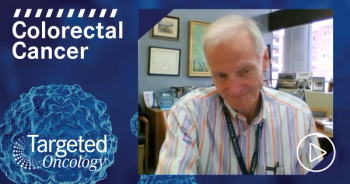
Maintenance Therapy in mCRC
Tanios Bekaii-Saab, MD, FACP:Maintenance therapy is a very important component of how we treat patients today in colon cancer. And the reason is we start understanding more and more how that links to quality of life and how it ends up not compromising outcome. There are 2 important things. Any time we think about treatment, the patient asks you the question, “How long am I going to be on this?” Since we’re talking about patients now survivingat least the right patient with the right treatment—beyond 3 or 4 years, there’s a good chance you know they’re going to have a good life—limited by the cancer, but a good life—and we have to optimize our treatments in a way to maximize the quality of life for our patients.
So, importantly comes the concept of maintenance therapy. In many ways, we look at the combination chemotherapywhether doublet or triplet—the majority of patients will go on doublet for 3 to 4 months. And we optimize their response and their initial outcome with a doublet. And usually after 4 months, you get this plateau. There’s no further benefit from aggressive induction therapy. This is where we consider maintenance therapies, and we have proof of concept. We have the phase III study that essentially looked at patients, after 3 months or 4 months of CapeOx/bevacizumab, going on capecitabine/bevacizumab—low dose, continuous—versus observational chemotherapy holiday.
The patients who went on the maintenance had an improvement in their progression-free survival in 2 instances and then there was a trend towards improving their survival. So, we know that essentially those patients tend to maintain the benefits of chemotherapy by going to a less aggressive maintenance therapy. We also know the cumulative knowledge of the previous years from a multitude of studies, like OPTIMOX. There were some studies with FOLFIRI on and off. They all suggest the same: that we can give our patients a break with maintenance.
In fact, I’d go further. There are some patients in my clinic and in my colleagues’ clinics who come and say, “I’ve had a response, I feel good, I don’t want to do any further therapy at this point of time.” And I think on a case-by-case basis, usually those are the patients who have fantastic responses or essentially who have a hard time with continuing, even with low-dose chemotherapy. For those patients, I think a chemotherapy holiday makes sense. But the majority of the patients should have maintenance therapy if possible.
Transcript edited for clarity.
November 2015
- A 62-year-old Caucasian female presents with severe crampy right lower quadrant pain
- 6-month history of occult bleeding and weight loss of 15 pounds in the last 8 months
- PMHx: tonsillectomy at age 23; hysterectomy at age 55
- FHx: Mother diagnosed with colon cancer at age 71
- Laboratory findings: remarkable for Hb, 7.6 g/dL; CEA 5.5 ng/mL
- Colonoscopy reveals a large mass in the ascending colon, measuring approximately 11 cm
- Biopsy results: Invasive, poorly differentiated adenocarcinoma
- Additional pathologic testing
- KRAS,NRAS, andBRAFwild-type
- Microsatellite stable
- CT scan revealed widespread lesions in the left lobe of the liver
- Performance status: 0
- Treatment was initiated with FOLFOX + bevacizumab
- The patient experienced mild neuropathy, significant mucositis, grade 4 neutropenia, and severe diarrhea with the first cycle (suspected DPD deficiency)
- She subsequently tolerated therapy well with 50% dose reduction of her regimen in addition to dropping the bolus 5-FU and leucovorin.
- Follow-up imaging showed reduction in the size of the liver lesions
- Patient is planned to start maintenance therapy with low-dose capecitabine plus bevacizumab after 8 cycles of FOLFOX
August 2016
- Follow-up CT showed progression in the liver with new lesions
- Performance status: 1
- She began therapy with mFOLFIRI + bevacizumab
- CEA levels stabilized
February 2017
- The patient complained of severe fatigue and additional weight loss. Her performance status remains at 1.
- CT scan revealed progressive disease with 2 new pulmonary nodules in the left lower lobe of the lung and mild progression in the liver.










































